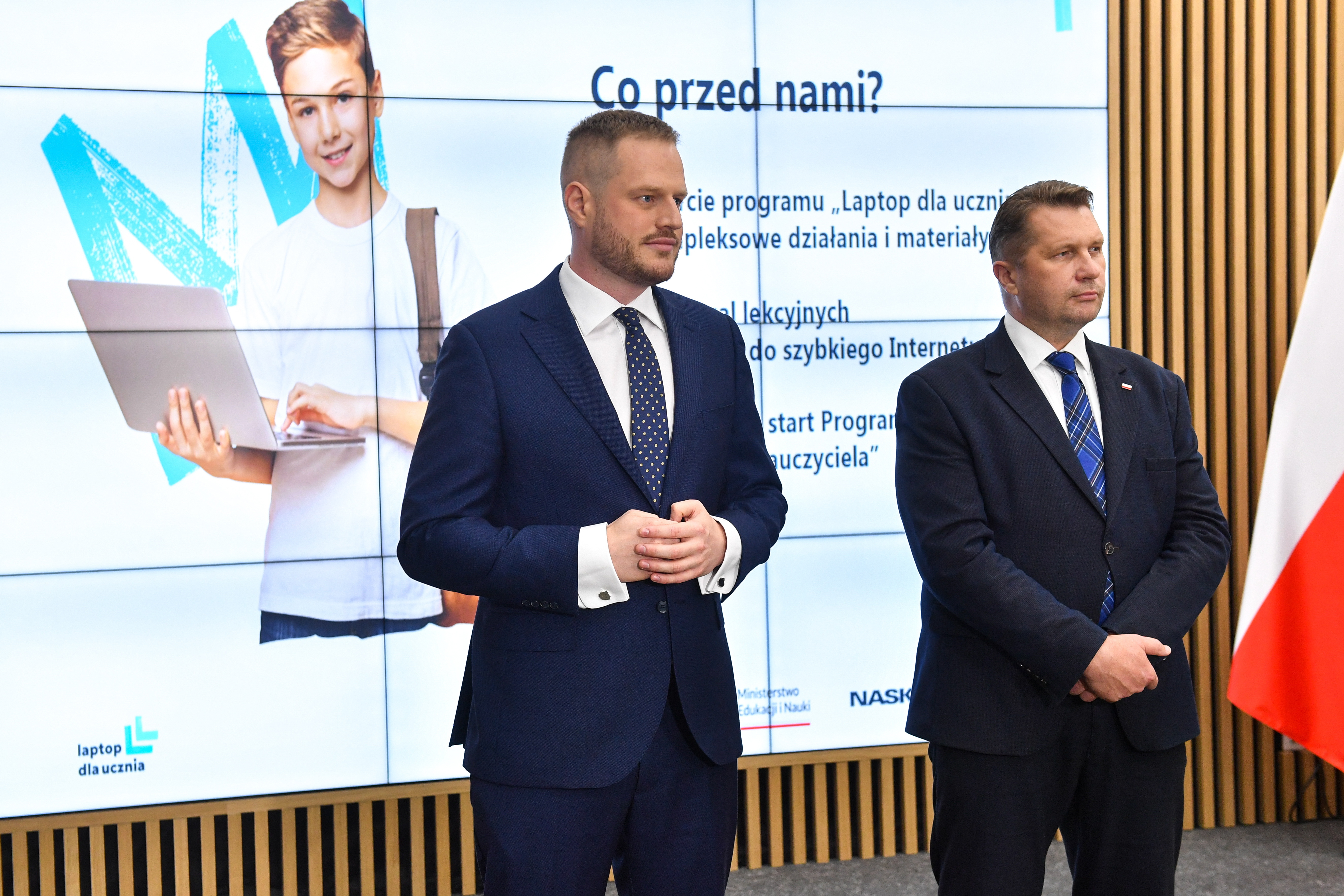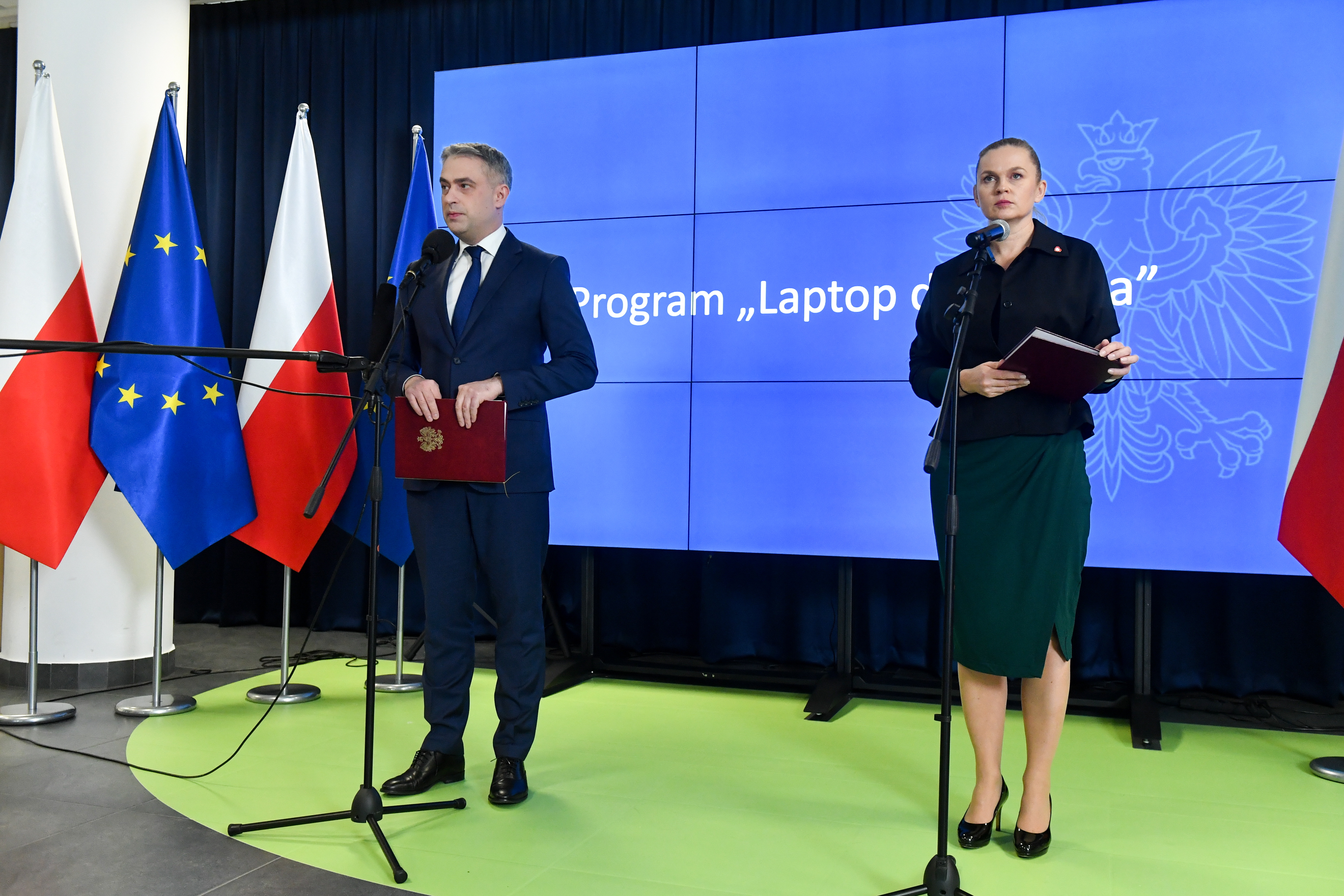PLN 4 billion from the National Resources Programme for school equipment. "A gift like the legend of the golden duck"

- Equipment for AI and STEM labs in schools is expected to cost PLN 2.4 billion. NASK, a research institute under the Ministry of Digital Affairs, has just announced a mega tender for 16,000 such labs.
- The spending doesn't end there. The government will spend PLN 1.4 billion on laptops and tablets for institutions. The Government Administration Service Center selected the contractors on Wednesday.
- The devices are financed by the National Operational Programme (KPO) and are scheduled to be delivered to schools by June 2026.
- Short consultation times for equipment lists, a tender announced during the peak holiday season, and a lack of educational or training programs are just some of the reservations we hear about the programs from the experts we interviewed.
"AI labs, laptops, and tablets are a gift like the legend of the golden duck. A poor shoemaker receives a purse of money, but must spend it all in one day," says Rafał Lew-Starowicz of the EdTech Foundation and a member of the Council for Computerization at the Ministry of National Education, summing up digitalization purchases for schools.
The government intends to equip facilities with equipment worth over PLN 4 billion within a year . However, deliveries must be organized in a hurry. This is the result of delays related to the National Recovery Plan. Mateusz Morawiecki's government is still responsible for some of this, while others are the result of bureaucratic obstruction by the current administration.
Each student has their own laptop. Shopping, however, is not available at KPO.Funding for the digitalization of education was included in the National Reform Programme (KPO) during Mateusz Morawiecki's term. However, its release was delayed because the so-called conditionality principle was introduced in EU spending, making the transfer of funds contingent on compliance with the rule of law in member states. This argument was used by the European Commission in the context of the dispute over the Polish judiciary.
Mateusz Morawiecki's government, however, didn't even submit a request for the payment. Although it wanted to spend the money, before the 2023 elections, Przemysław Czarnek and Janusz Cieszyński (then ministers of education and digital affairs) announced that every fourth-grader would receive their own laptop . The first purchases were to be financed from the National Education Programme (KPO) once payments were released.
The equipment was purchased for PLN 1.2 billion, and PiS MPs took advantage of the opportunity to attend the handover ceremonies for students in their districts. It later emerged that the European Commission had not approved this arrangement. The expenses were covered by the Polish Development Fund.
However, the provisions regarding spending on digital education in the National Education Programme (KPO) remained. After the new government was sworn in in December 2023, a race against time began to adapt national programs to spend the money.

The ministries of education and digital affairs, led by Barbara Nowacka and Krzysztof Gawkowski, suspended the "Laptop for Students" program, which had been negatively assessed by the European Commission, in February 2024. At a press conference, the politicians promised to present a revised version in June of that same year. This never happened.
Provisions canceling the distribution of laptops were included in the Flood Act in September. The regulation introducing the new "Digital Student" program was not prepared until August 11, 2025, 14 months after the initial declaration .
Meanwhile, preparations for hardware purchases were underway. The Ministry of National Education adopted the "Digital Transformation of Education Policy," a resolution outlining how to digitize schools. It passed, although it was criticized during public consultations by, among others, the Polish Teachers' Union. The Polish Information Processing Society (PIIT) warned that the policy was so poor that it was completely unsuitable for government adoption. However, the Ministry of National Education needed it as a basis for the European Commission—it was a milestone in the National Information Processing Committee (KPO).
The documents allowed us to obtain the European Commission's approval to spend the funds under the plan. In May 2025, the Ministry of Digital Affairs announced a mega-tender for laptops, tablets, and browser-based laptops , which will be distributed to public institutions (and not to students, as was the case last time) by the end of the next school year. Late, because—as Ministry of Digital Affairs officials complained to us—the Ministry of National Education delayed preparing the list of schools needed to launch the program.
Value? PLN 1.7 billion. In this tender alone, the purchase list includes: 404,000 laptops, 110,000 browser-based laptops, and 220,500 tablets. On Wednesday, August 13th, the Government Administration Service Center, which handled the tender, announced the results. But that's not all for the KPO purchase list.

Another massive tender is being conducted by the state research institute NASK, which reports to the Ministry of Digital Affairs. It will spend PLN 2.4 billion on equipment to equip artificial intelligence labs in 12,000 schools and STEM labs in another 4,000 schools.
Work on this order progressed at a surprising pace. At the turn of December and January, the Ministry of National Education granted only five working days for consultation on what should be included in the labs (the ministry had prepared one version of the kit for AI and three for STEM – school principals were to choose which one they wanted). The deadline was slightly extended after objections from the market.
Two months later, in March, NASK also consulted on the kits as part of its dialogue with the market. Then, for five months, there was silence on the purchases.
The robots were purchased earlier. It's unknown what the results were.In EU projects, the project schedule is known in advance, allowing manufacturers to prepare for increased deliveries. Here, things were chaotic, with the tender ultimately announced during the peak holiday season. Ultimately, it resulted primarily in a program for foreign equipment manufacturers and their collaborating suppliers, who can expect an increase in available equipment overnight, notes Lew-Starowicz.
In addition, entrepreneurs monitoring the tender have noticed changes in the specifications for the school labs. The programmable robots previously present in the labs have disappeared from the purchase list presented by NASK. NASK explained to one of the institutions interested in the tender that it had removed them because they were already being distributed to schools under a different program, " Laboratories of the Future."
This involved one billion złoty, which was pumped into school equipment during Przemysław Czarnek's term in 2021-2022. The money came from the Covid-19 Countermeasures Fund. Unlike under the KPO, schools received cash in hand and could spend it on a strictly defined list of equipment, including robots and 3D printers.
The program was negatively assessed by the Supreme Audit Office. The NIK report indicates that while funding was granted, no one knows what the results were. The Ministry conducted no monitoring. Furthermore, it remains unclear why certain equipment was included on the purchase list. "However, the process of initially compiling the catalog was not documented," the NIK wrote.
The buses were supposed to run and teach, so they parked in front of the Warsaw University of Life Sciences (SGGW).The Laboratories of the Future were also criticized because the equipment was not accompanied by educational programs or teacher training. These were later supplemented by another program, " Mobile Laboratories of the Future."
Educators were supposed to travel to schools to demonstrate and support teachers. Initially, they did this in rented buses, but in the final days of Mateusz Morawiecki's three-week government, the GovTech Center (CGT), responsible for the project, purchased 16 vehicles.
After the change of government, the idea was abandoned, the educators were dismissed, and the buses were parked at the Warsaw University of Life Sciences (SGGW) for several months. The reason? The administrative chaos that arose after the Ministry of Education and Science was split into the Ministry of National Education and Science and the Ministry of Science and Higher Education. The CGT, responsible for the educational project, was assigned to the scientific Ministry of Science and Higher Education. No new ideas for utilizing the team and equipment were found there. Schools were left with expensive purchases but no support.
For now, it seems the same mistakes are being repeated. Ministries are only promising future training, but they don't make the allocation of equipment dependent on whether someone learns to use it in school, says Piotr Mieczkowski, board member of the Polish Chamber of Commerce for Electronics and Telecommunications (KIGEiT).
"The Ministry of Digital Affairs has done its part. Now the Ministry of Education should definitely launch such training," admits Michał Kanownik, president of the Digital Poland Association, an organization representing major electronics manufacturers such as Acer, Dell, HP, and Samsung.
"Giving away equipment without content will be a bad repeat"As Mieczkowski points out, the tender announced by NASK also lacks a requirement that the equipment include educational materials. This is another requirement that has disappeared from the device specifications – similarly to the robots, it was still present when the Ministry of National Education consulted on the purchase list for the AI lab. We asked the ministry and NASK why the word "content" was no longer included in the order. However, by the time this article was published, we had not received a response.
- I hope that such educational materials will appear, for example as part of the "Digital Student" program that has just been announced, because handing out equipment without content will be a bad repeat of the previous government's times - argues Mieczkowski.
Lew-Starowicz from the EdTech Foundation also talks about training for schools.
"When we analyzed how schools use information and communication technologies, we found that they were primarily used in computer science classes. If we are serious about digitalizing schools, we should increase their use in other subjects as well. However, schools need support for this," he argues.
The Ministry of National Education (MEN) has announced that training will be provided under other EU programs. The use of equipment in classes is expected to increase after the core curriculum reform, which will begin in 2026. The ministry is currently still working on it.
wnp.pl



